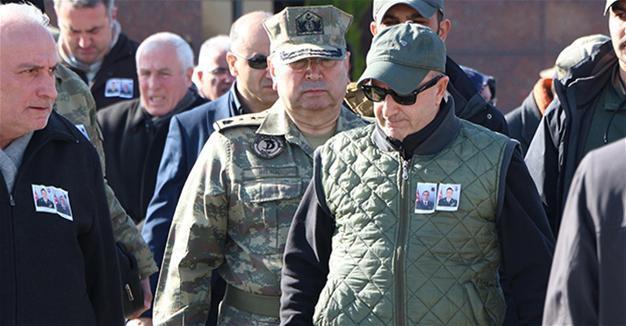Turkish commander to testify as witness in case for murder of soldier who resisted coup attempt
ANKARA

DHA photo
A court has ruled for Special Forces Commander Lt. Gen. Zekai Aksakallı to testify as a witness in the case into the killing of anti-coup soldier Ömer Halisdemir, who has been idolized for his resistance during a raid on the Special Forces Command in Ankara.
The Ankara 14th Heavy Penal Court on Feb. 21 started the trials of 18 suspects in the case regarding the murder of non-commissioned officer Halisdemir, who shot pro-coup general Semih Terzi after the latter arrived at the commandership to capture it as part of coup activities on July 15, 2016.
The court ruled for the continuation of arrests of all suspects in the interim decision of the case, based on the existing state of evidence and the insufficiency of judicial control conditions.
The court board has stated that the witnesses will be heard in the next hearing of the case. In addition to Aksakallı, Captain Ahmet Kemal Yılmaz and Captain Volkan Vural Bal will testify as witnesses.
Aksakallı, in his former capacity as major general, played a key role in the defeat of the attempted coup after realizing that his deputy, Terzi, was an active member of the junta.
Terzi was actually in charge of the special ops along the Syria border (and when necessary across it). He was not supposed to be in the capital Ankara on the night of the coup attempt but he was there to raid and seize the Special Forces HQ near the city.
Aksakallı got trapped inside the Special Forces HQ as the plot was underway, after which he phoned his bodyguard, Halisdemir, who was outside the building. According to his own testimony, Aksakallı told Halisdemir that Terzi was a traitor and said Halisdemir should stop him from entering the building, shooting and killing him - if necessary at the expense of his own “martyrdom.”
As soon as he received these orders, Halisdemir intervened in the soldiers advancing toward the building with Terzi. He ordered them to stop but they instead sprayed him with bullets, killing him on the spot.
Speaking during the hearing, Mihrali Atmaca, who killed Halisdemir, said he did not know who he was shooting at.
“I fired two bullets into the darkness upon the orders of Fatih Şahin. I didn’t know I was shooting at Halisdemir. I’m so sorry,” Atmaca told the court, adding that they “thought they were standing up against the coup plotting rebel terrorists.”
“When we got on the plane to go to Ankara, we were told that a small group is attempting to stage a coup. They told us that clashes might erupt when we land. We were ordered to save the Special Forces Command from coup-plotters,” he added.
The court also ruled to decipher all video footage in the case and form a specialist team to report on the incidents. The appointment scheme that shows the chain of command on the day of the murder of Halisdemir and a report regarding the features of the plane that carried the suspects from the southeastern province of Diyarbakır to Ankara were among the details that the court has requested.
A precept will be written to the Chief Public Prosecutor’s Office in order to determine whether the suspects are users of ByLock, a smartphone app that came to prominence after it was determined that it was used by the network of the U.S.-based Islamic preacher Fethullah Gülen, widely believed to have been behind the coup attempt. The examination results of the digital data that was confiscated will be added to the case.
The next hearings into the case are scheduled to be held on March 20, 21 and 22.
Some 18 suspects, who are currently accused of deliberately killing the soldier and attempting to remove the government, are facing multiple life sentences. All 18 suspects also face up to 15 years in jail for their alleged membership to an “armed terror organization.”
